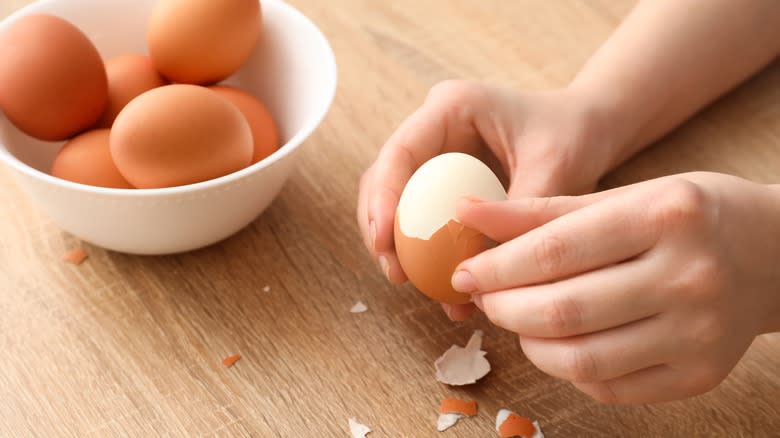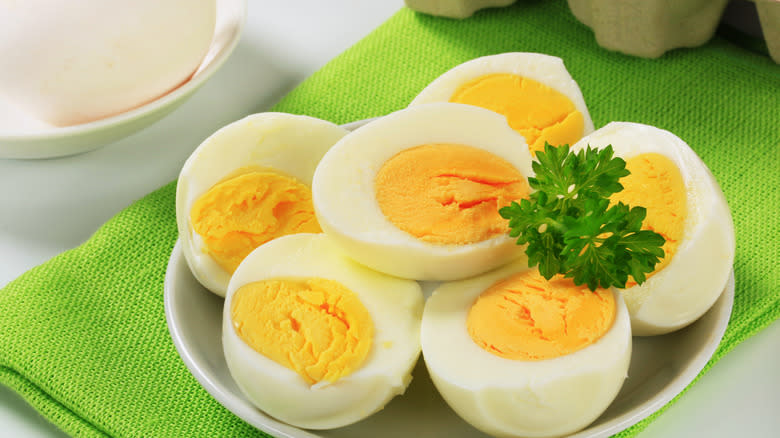The Baking Soda Hack For Easy Peel Hard-Boiled Eggs

Hard-boiled eggs are a tasty and nutritious food that works as an appetizer, snack, or lunchtime accompaniment. While you may have the perfect recipe for hard-boiled eggs, peeling is another matter altogether. Fans of this food often bemoan how tough it is to release the shell from the egg efficiently, but there's one hack that can make the process a lot quicker and less frustrating. Just incorporate about a half teaspoon of baking soda into the boiling water and watch as the shell slides right off under your fingers.
It's all about pH, as baking soda increases the pH level of eggs when added to water. When eggs have a low pH level, the albumen (aka the white part of the egg) will cling to the shell, thereby making peeling an absolute nightmare. It's also worth noting that eggs of a certain age naturally have lower pH levels, which is a major factor in how challenging individual eggs are when it comes to peeling.
Read more: The 20 Best Egg Brands, Ranked
Reasons Why Some Hard-Boiled Eggs Are Tough To Peel

If you're serious about your hard-boiled eggs, you've probably noticed that some are a lot harder to peel than others. Along with avoiding other common hard-boiled egg mistakes, you must also be selective when it comes to the age of the eggs you boil. Older eggs are best if you want an easy peeling experience (made even more efficient when you employ the helpful baking soda hack). In this case, try to use eggs that range from one to two weeks old.
While fresh is often considered best when it comes to food, it's not so handy with hard-boiled eggs. That's because the inside of the egg slowly and steadily detaches from the shell over time. When an egg is fresh out of the chicken, the bond between the membrane and the shell is strongest. As time goes on, this bond naturally weakens, which results in an egg that can be peeled rather efficiently. Of course, there's more than one way to make short work of a hard-boiled egg.
Consider Vinegar As An Alternative To The Baking Soda Hack

Along with baking soda, vinegar can also make the process of peeling eggs a lot less challenging. Like baking soda, vinegar gets added to the water you use to boil the eggs. Because vinegar is acidic, it helps break down eggshells to prevent them from clinging to the egg too aggressively. Vinegar also helps harden the white part of the egg, which makes for easier peeling. As for which hack is most effective, your mileage will most likely vary.
Consider that other factors, such as the freshness of the eggs, will impact how easy (or difficult) they are to peel. That means that the baking soda method might not return the desired results every time. It should be noted that adding vinegar to the water prior to boiling eggs does result in a smoother egg white and a more even peel. Also, consider that some people claim to have consistent success with a completely different method. On Reddit, one egg enthusiast lives and dies by the ice bath. According to the commenter, "I do 14 minutes in a hard boil then to ice bath... Been doing it this way for 15 years with excellent results." Just something to keep in mind when you're making a whole slew of the creamiest deviled eggs ever for a gathering.
Read the original article on Daily Meal.

